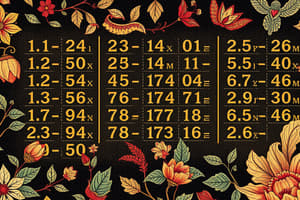Podcast
Questions and Answers
What does 'mm' stand for in measurement abbreviations?
What does 'mm' stand for in measurement abbreviations?
- Millimeter (correct)
- Meter meter
- Micro-meter
- Machine meter
In scientific writing, what is the best practice regarding measurement abbreviations?
In scientific writing, what is the best practice regarding measurement abbreviations?
- Spell out the abbreviation only once
- Avoid using abbreviations at all
- Use the abbreviation without spelling it out
- Spell out measurement abbreviations on first use (correct)
Which of the following fields commonly use the 'mm' abbreviation?
Which of the following fields commonly use the 'mm' abbreviation?
- Mechanical engineering (correct)
- Astronomy
- Psychology
- Cooking
What is the approximate equivalent of 1 millimeter in inches?
What is the approximate equivalent of 1 millimeter in inches?
When should measurement abbreviations be spelled out in scientific writing?
When should measurement abbreviations be spelled out in scientific writing?
Which of the following is true about mm in recipes and cooking measurements?
Which of the following is true about mm in recipes and cooking measurements?
What is the abbreviation for a cup in cooking and baking?
What is the abbreviation for a cup in cooking and baking?
How many fluid ounces is approximately equivalent to 1 cup?
How many fluid ounces is approximately equivalent to 1 cup?
Which of the following units is not commonly used in measuring volume like cups?
Which of the following units is not commonly used in measuring volume like cups?
What is the abbreviation for kilogram?
What is the abbreviation for kilogram?
How many milliliters are approximately equivalent to 1 cup?
How many milliliters are approximately equivalent to 1 cup?
Which unit of measurement does 'c' stand for in the abbreviation for a cup?
Which unit of measurement does 'c' stand for in the abbreviation for a cup?
Flashcards are hidden until you start studying
Study Notes
Measurement Abbreviations: Focus on mm (Millimeters)
Measurement abbreviations simplify communication by providing concise symbols for standard units. In scientific writing, specific guidelines help ensure clarity and consistency. This article will focus on the millimeter (mm) abbreviation, crucial in many scientific, technical, and everyday contexts.
Millimeter (mm)
- A millimeter (abbreviated as mm) is 1/1000 of a meter, or about 0.039 inches.
- The millimeter is a key unit for measuring small distances, thicknesses, and sizes.
In scientific writing, it's best practice to spell out measurement abbreviations on first use, then enclose the abbreviation in parentheses beside the spelled-out term. However, in less technical contexts, it's common to use the abbreviation without spelling it out.
The mm abbreviation is widely used in various fields, including:
- Science (e.g., microbiology, biology, chemistry, and physics)
- Engineering (e.g., mechanical, electrical, and civil engineering)
- Manufacturing
- Construction
- Graphic design
- Art
Here are some common millimeter equivalents to other units:
- 10 mm is approximately 0.39 inches
- 1 mm is approximately 0.039 inches
- 1 mm is 1/1000 meter
In recipes and cooking measurements, mm is not commonly used, but the metric system often includes millimeters in the context of ingredients like chocolate bars.
As with other measurement abbreviations, it's essential to be consistent and use mm consistently to avoid confusion. The correct usage of mm and other measurement abbreviations is crucial for clear communication and understanding among professionals and everyday users.
Studying That Suits You
Use AI to generate personalized quizzes and flashcards to suit your learning preferences.




